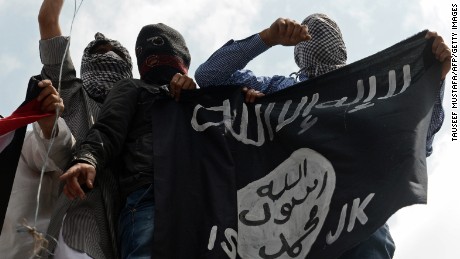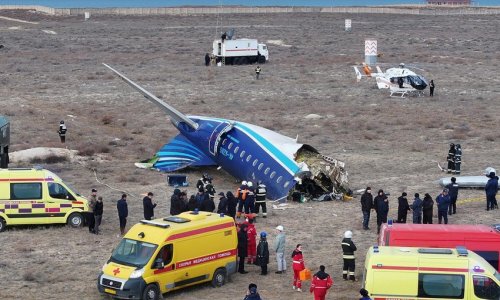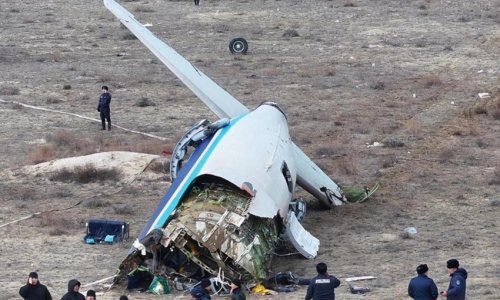Egypt's military carried out a series of airstrikes against ISIS militants in Libya on Monday in retaliation for the slaughter of 21 Egyptian Christians by the jihadist group.
The bombing raids pulled Egypt deeper into the widening international fight against ISIS and highlighted the extremists' growing presence in North Africa.
The warplanes hit 10 targets used for training and storage in ISIS' Libyan stronghold of Derna, Egyptian Foreign Minister Sameh Shoukry told CNN.
"Avenging Egyptian blood and punishing criminals and murderers is our right and duty," the Egyptian military said in a statement that was broadcast on state television.
Islamists warn of 'harsh and painful' response
There were conflicting claims about what the bombs had struck.
"These were surgical strikes based on very accurate intelligence and related to degrading the capabilities of ISIS within the city of Derna," Shoukry told CNN's Erin Burnett.
But an umbrella group of Islamist militias in Derna issued a statement saying that the city "woke up to a disaster today as Egyptian military jets targeted civilians in residential areas in the city."
The statement reported that the bombings had killed women and children, and it warned the Egyptian government of a "harsh and painful" response to come.
CNN couldn't independently verify what damage and casualties the airstrikes had caused.
Egypt's aerial assault came after ISIS released a gruesome video Sunday that appeared to show militants beheading at least a dozen Egyptian Christians on a Libyan beach.
Threats from English-speaking jihadi
The footage, bearing many of the hallmarks of previous ISIS videos of the killing of hostages, has intensified international concerns about ISIS' deepening reach into countries far beyond its strongholds in Syria and Iraq.
The slickly produced video shows the apparent mass killing, with jihadists in black standing behind each of the victims, who are all dressed in orange jumpsuits with their hands cuffed behind them.
Twenty-one Egyptian Christians were kidnapped in the Libyan coastal city of Sirte in two separate incidents in December and January. They were reportedly from impoverished villages and went to Libya looking for work.
Although the ISIS video showed around a dozen men being beheaded, Egyptian officials said that all 21 Christians were believed to have been killed.
Some of the hostages cry out "Oh God" and "Oh Jesus" as they are pushed to their knees.
The five-minute video, released by ISIS' propaganda wing al-Hayat Media, includes a masked English-speaking jihadi who says, "The sea you have hidden Sheikh Osama bin Laden's body in, we swear to Allah, we will mix it with your blood."
The video threatens Egypt, which shares a long border with Libya, and also Europe, whose shores lie across the Mediterranean Sea.
'The right of retaliation'
Egyptian President Abdel Fattah el-Sisi had warned Sunday that his country "reserves the right of retaliation and with the methods and timing it sees fit for retribution for those murderers and criminals who are without the slightest humanity."
He also declared a week of mourning in the Muslim majority nation for the slain Christians.
In a statement, Egypt's Foreign Ministry called for other nations battling ISIS to support Egypt's efforts and to target terrorists in Libya, as well.
The U.S. government condemned the killings, saying ISIS' "barbarity knows no bounds." U.S. Secretary of State John Kerry called Egyptian Foreign Minister Sameh Shoukry on Sunday to offer condolences, the State Department said.
Egypt is already fighting against ISIS-allied militants on its own territory in the Sinai Peninsula, where dozens of people were killed in a series of attacks in January.
Growing ISIS presence in Libya
Concern has increased over ISIS' rising influence in Libya amid the power and security vacuum prevalent in the country since the 2011 uprising that overthrew former dictator Moammar Gadhafi.
CNN reported in November that fighters loyal to ISIS had complete control of the city of Derna, which has a population of about 100,000 and is situated not far from the Egyptian border.
Jihadists with allegiance to ISIS had also expanded their presence westward along the Libyan coast, forming chapters in cities including Benghazi, Sirte and even Tripoli, the capital, according to Noman Benotman, a former Libyan jihadist now involved in counterterrorism for the Quilliam Foundation.
In an example of the group's spreading reach, a Libyan branch of ISIS claimed responsibility for a deadly attack on a luxury hotel in Tripoli that killed 10 people, including one American.
"There's been a real radical Islamist presence in Libya for some time," said Lt. Col. Rick Francona, a retired U.S. Air Force intelligence officer. "What's worrying is now they are self-identifying with ISIS."
Ties between ISIS branches
Questions remain over how much direct command and control the ISIS leadership in Syria and Iraq has over its North African affiliates.
The killings of the Egyptian Christians has filled in some of the detail. Before the grisly video was released, ISIS had released photos in its English-language magazine Dabiq, claiming they had been killed.
"There's certainly communication between the Libyan affiliate and the affiliate in Syria about matters of importance to both of them," said CNN national security analyst Peter Bergen.
He said the ties between Libyan jihadists and ISIS' precursor, al Qaeda in Iraq, "go back a very long time."
The links between the different branches present "a real challenge" for Western leaders, Francona said, as U.S. President Barack Obama asked Congress to formally authorize the use of military force in the war against ISIS.
"While we can come up with a military solution or a military operation in a restricted area like Syria and Iraq, what do we do when it expands to North Africa?" Francona asked.
(CNN)
ANN.Az
Follow us !











